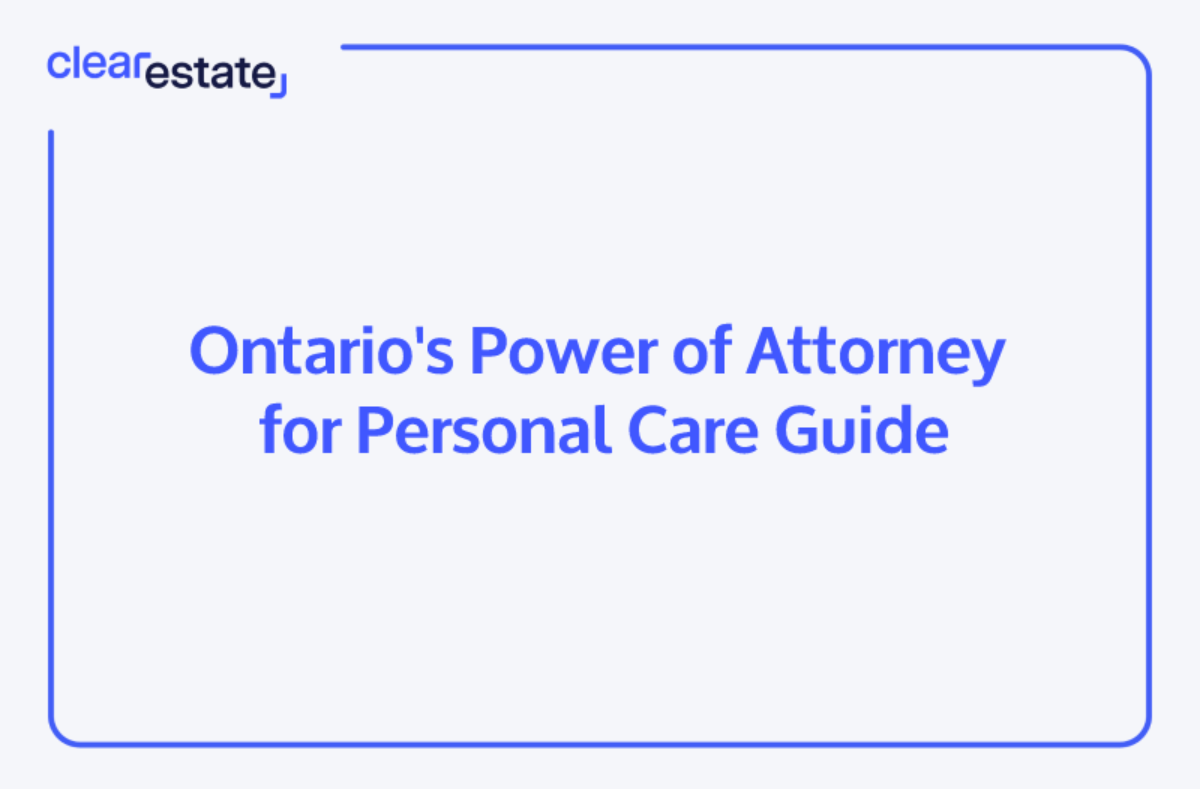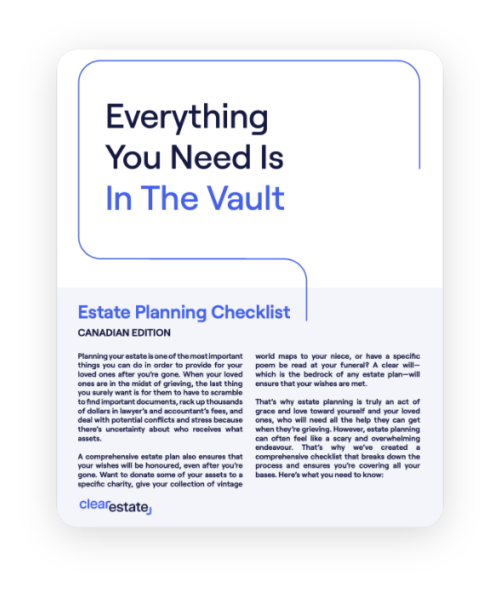Estate Planning
Oct 27, 2025
Introducing Empathy to Estate Bureaucracy
ClearEstate’s origin story: how grief, inefficiency, and compassion inspired Alex to build a fintech that brings empathy and efficiency to estate planning and settlement
Ontario's Power of Attorney for Personal Care: Understand its importance, setup process, and how it protects your interests.


Article Contents
The unpredictable nature of life can result in worry about what would happen if you could not make personal decisions. These uncertainties brought about by an illness or accident can be unsettling. Fortunately, Ontario takes care of these concerns using the Power of Attorney for Personal Care.
The Power of Attorney for Personal Care safeguards your interests by assigning powers to a trusted person to make healthcare and personal decisions on your behalf. This document ensures your voice is heard even when you are mentally incapacitated or in a coma.
So, what exactly is a POA for personal care? How do you set it up? What are the roles and responsibilities of the attorney, and can you revoke or change these roles and responsibilities or even the attorney themselves? These are the concerns we will address today in this comprehensive guide. Let's begin by giving you a clearer definition of POA for personal care.
A Power of Attorney for Personal Care (POAPC), sometimes called a personal power of attorney, is a legal document in which you, as the grantor, appoint another person, known as the attorney, to make decisions on your behalf when you become mentally incapable.
The individual you choose can be a close friend, family member, a professional related to you, or anyone you trust. The POAPC grants your attorney permission to make decisions about the following:
Remember, this isn't everything. The POAPC can cover other things too, depending on what you need and want.
Now, what does it mean to be mentally incapable? It means you can't make decisions well or understand what could happen because of your decisions. This could be due to dementia, mental illness, intellectual disabilities, being unconscious, or cognitive decline related to aging.
Sometimes, people can get better and start making decisions again. This could happen if their health condition improves or if they were only temporarily affected by a medical treatment. But getting back the legal ability to make decisions can be a bit complicated. It usually involves a check-up by a healthcare professional and might even require some legal steps, depending on the situation.
General POAPC | Non-Continuing POAPC | Continuing POAPC | Special/Limited POAPC | |
|
Decision- Making | Broad authority over personal care | Limited authority and specific to situations outlined in the document | Broad authority over personal care | Limited authority for specific decisions |
Mental Incapacity Requirement | Begins when you become mentally incapable | Doesn't require you to be mentally incapable but is used for temporary situations like surgery | Comes into effect when the grantor is mentally incapable | Doesn't require you to be mentally incapable but is used for specific situations |
Duration of Authority | Remains valid until revoked or upon your demise | Limited duration as specified in the document | Stops working when you revoke it, or you pass away | Used for the specific situation defined in the document |
You need a Power of Attorney for Personal Care if you suddenly fall ill or are involved in a serious accident that incapacitates you for a temporary duration. A POAPC ensures your personal needs are met even in this state.
As you age, POAPC becomes helpful because you may lose the ability to make well-thought-out decisions about sensitive matters like healthcare. In addition, end-of-life care also requires you to have someone who can make difficult decisions on your behalf in alignment with your wishes. Other benefits of having a Power of Attorney for Personal Care are:
Setting up a Power of Attorney for Personal Care is a relatively simple process in Ontario. The government provides a detailed guidebook containing a POAPC form at the end. The steps to take in making a legally binding POAPC are as follows:
As you make your POA for personal care, remember to avoid mistakes that may undermine or invalidate its effectiveness. For instance, do not be too vague when giving instructions or outlining your wishes. You must also ensure you execute the document according to Ontario laws.
Therefore, research carefully or hire a professional to ensure you have included everything and followed proper procedure. Other legal requirements and considerations to have in mind as you draft your POAPC are:
The attorney for personal care, also known as a substitute decision-maker, adopts important duties once they accept the role. The following are the main roles and responsibilities your attorney for personal care will perform:
It may be necessary to seek guidance from an experienced professional to help you grant the right powers and understand the legal obligations of the attorney for personal care.
In Ontario, you have the right to change or revoke a Power of Attorney for Personal Care if your relationship with the attorney takes a new turn, you want to change some preferences, you have concerns about misconduct, or your mental capacity has improved. The steps to change or revoke a POAPC are as follows:
Revoking or changing a Power of Attorney for Personal Care should be done with the same care as if you were drafting a new POAPC. Ensure you include all the details to avoid legal repercussions in case of a disagreement with the previous attorney.
Establishing a POA for personal care in Ontario is essential in ensuring those involved respect your personal and healthcare wishes. A valid POAPC remains effective unless you revoke it, the specific task ends, or upon your demise.
To ensure you follow Ontario laws and regulations, it is in your best interest to work with an estate planning professional who can provide valuable guidance to your specific needs and circumstances.
At ClearEstate, we ensure your Power of Attorney for Personal Care reflects your wishes and complies with Ontario laws. Contact us today for a free consultation.
 Secure Your Legacy
Secure Your Legacy
Get your free 12-step Estate Planning checklist now. 89% of readers complete their estate plan within 3 months of using our guide.
Instantly Access Now